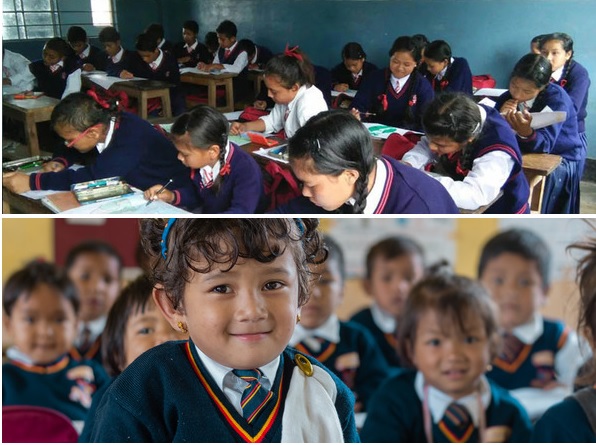Meghalaya Teacher Eligibility Test Sample Question Paper MTET : Directorate Of Educational Research & Training
Organisation : Meghalaya Directorate Of Educational Research And Training
Recruitment Name : Meghalaya Teacher Eligibility Test (MTET)
Document Type : Sample Question Paper
Year : 2021
Website : https://megeducation.gov.in/dert/pages/dert_notice_board.html
Meghalaya Teacher Eligibility Test Sample Question Paper
Choose the correct answer:
1. The branch of Psychology which deals with teaching and learning is known as
a) Educational Psychology
b) Physiological Psychology
c) Social Psychology
d) Development Psychology
Related / Similar Question Paper : MBSE MTET Previous Years Question Paper Mizoram Teacher Eligibility Test

2. Childhood stage is a period between
a) 1 to 5 years
b) 5 to 12 years
c) 12 to 15 years
d) 15 to 20 years
3. Development
a) Is a continuous process
b) Stops with maturity
c) Stops when physical growth stops
d) Continues only up to adolescence
4. The physical growth during infancy period is accompanied by
a) Motor activity
b)Cognitiveability
c)Assimilation of the environment
d) None of these
5. Development starts from
a) Pre-natal stage
b) Infancy stage
c) Pre-childhood stage
d) Post-childhood stage
6. Which one of the following statement can-not be categorized as an Activity Based Method?
a) Asking the students to explore the different parts of a plant
b) Explaining to children about the different parts of a plant using the blackboard
c) Encourage the students to differentiate the different types of leaves
d) Facilitate children to collect different types of flowers from the environment and differenti-ate them
7. The term Psychology has its origin from:
a) Latin
b) Greek
c) German
d) French
8. Growth usually indicates
a) Change in social behavior of an indiaidual
b) Change in emotional behavior of an indi-vidual
c) Change in the quality or character
d) Physical change in a body which can be observed and measured
9. Which one of the following is a true state-ment corresponding to Cephalocaudal prin-ciple?
a) Developmcnt is from head to foot
b) Development is from foot to head
c) Development is from middle to periphery
d) None of these
10. Inclusive Education is based on the phi-losophy of
a) Segregation
b) Acceptance
c) Exclusion
d) None of these
11. If a child writes 16 as 61 and get confused between b & d. this is a case of
a) Visual Impairment
b) Learning Disability
c) Mental Impairment
d) Mental Retardation
12. Which one of the following is a Role Play Method
a)Children draws the picture of an Elephant in a drawing book
b) Children answer to questions given by the teacher orally
c) Children play the character of Jack and Jill in the classroom
d) Children sing the ABC songs
13. When Children With Special Needs (CWSN)has to adapt to the formal system of Educition, such type of Education is called
a) Inclusive Education
b) Integrated Education
c) Both Integrated and Inclusive Education
d) None of the above
14. When a study focuses on one person in depth, giving a detailed view of a particular condition or set of behaviours then it is called
a) Survey Study
b) Case Study
c)Action Research
d) Experimental Study
15. Which one of the following is a Constructivist Approach of teaching and learn-ing?
a) Teacher explains the concept of Evapora-tion using a model
b) Teacher explains to the children about grav-ity and ask students to answer some questions asked by the teacher
c) Teacher ask the students to sit individually and do self learning after classroom teaching
d) Teacher provides a ‘magnet’ and ‘pins’ to students and ask them to explore in order to understand “Magnetic Force”
16. A classroom where students sits in rows and columns. keep quiet, listen to the lecture of the teacher all the time, this refers to a
a) Child-centered Classroom
b) Teacher-centered Classroom
c) Both teacher and child centered Classroom
d) None of the above
17. Which of the following is not an adaptive materials for children with Visual impairment
a) Braille slates
b) Cane
c) Ordinary Print Text books
d) Taylor frame
18. A learner who could not achieve what he is supposed to achieve due to some external fac-tors is called as:
a) Slow learner
b) Under achiever
c) Gifted child
d) Creative learner
19. Functional incapability of a person in their day to day life is termed as
a) Impairment
b) Handicap
c) Disability
d) None of the above
MTET Syllabus
CHILD DEVELOPMENT AND PEDAGOGY
PAPER-I :
1. Understanding Development
Concept of Development stage.
Development is continuous and a lifelong process.
Stages of Development with respect from infancy to Childhood
2. Aspects of Development
Development of Children in a socio-cultural context.
Factors affecting development.
Physical and Motor Development.
Cognitive Development.
Social and Emotional Development.
Moral development.
Language Development.
3. Gender Development
Concept of Gender and sex.
Gender socialization and stereotypes.
4. Methods of child study
Naturalistic and participant observation.
Case study
Reflective journals.
Gender inequality (Gender bias and educational Practices).
Role of a teacher on gender equality.
Student portfolio.
Anecdotal records.
Questionnaires.
5. Inclusive Education and Children with Special Needs (CWSN)
Concepts, meaning of Inclusive Education.
Difference between Integrated and Inclusive Education.
Understanding Disability and types of Disability.
Understanding exceptional students (Talented, Creative, Slow
learners, and Under-Achievers).
Teacher’s role for CWSN.

Download Question Paper
MTET Sample Question Paper 2021 – https://www.pdfquestion.in/uploads/pdf2024/42972-q.pdf